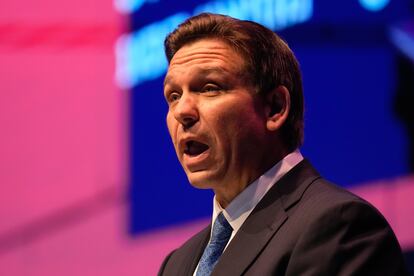Florida Gov. DeSantis says Disney lawsuit is political
Disney alleges the governor waged a “targeted campaign of government retaliation” after the company opposed a law critics call “Don’t Say Gay”. DeSantis said Disney should be held accountable under a new board he appointed, rather than govern itself

Florida Gov. Ron DeSantis on Thursday shrugged off Disney’s lawsuit against him as politically motivated, and said that it was time for the iconic company to stop enjoying favorable treatment in his state.
Disney sued DeSantis on Wednesday over the Republican’s appointment of a board of supervisors in its self-governed theme park district, alleging the governor waged a “targeted campaign of government retaliation” after the company opposed a law critics call, “Don’t Say Gay.”
The legal filing is the latest salvo in a more than year-old feud between Disney and DeSantis that has engulfed the governor in criticism as he prepares to launch an expected 2024 presidential bid.
“They’re upset because they’re having to live by the same rules as everybody else. They don’t want to pay the same taxes as everybody else and they want to be able to control things without proper oversight,” DeSantis said during a visit to Israel. “The days of putting one company on a pedestal with no accountability are over in the state of Florida.”
DeSantis was speaking on the third leg of an international trip meant to burnish his foreign policy credentials ahead of a potential campaign for the Republican presidential nomination as a key rival to former President Donald Trump.
DeSantis has dived headlong into the fray with Disney, a major driver of tourism and a font for employment in Florida, as business leaders and White House rivals have bashed his stance as a rejection of the small-government tenets of conservatism.
The fight began last year after Disney, in the face of significant pressure, publicly opposed a state law that bans classroom lessons on sexual orientation and gender identity in early grades, a policy critics call “Don’t Say Gay.”
DeSantis then took over Disney World’s self-governing district and appointed a new board of supervisors to oversee municipal services in the sprawling theme parks. But before the new board came in, the company pushed though an 11th-hour agreement that stripped the new supervisors of much of their authority.
The Disney lawsuit asks a federal judge to void the governor’s takeover of the theme park district, as well as the DeSantis oversight board’s actions, on the grounds that they were violations of the company’s free speech rights.
In a speech to a conference at Jerusalem’s Museum of Tolerance, DeSantis also spelled out his Middle East policy, speaking of the importance of the U.S.-Israel alliance. He said Israel was the only authority that could protect freedom of worship for all in combustible Jerusalem and that the U.S. embassy was rightfully moved to the city by the Trump administration, despite opposition from Palestinians.
He repeated his opposition to the deal that aimed to rein in Iran’s nuclear program, saying it empowered that country’s rulers rather than held them back. The Iran nuclear deal passed under former President Barak Obama. His successor, Trump, revoked the U.S. agreement to it.
In a critique of President Joe Biden, DeSantis also said that the U.S. shouldn’t interfere in the way that Israel chooses to be governed. Biden voiced concerns last month about a contentious Israeli government plan to overhaul the country’s judiciary.
DeSantis began his multi-country trip in Japan and then traveled to South Korea. After Israel, he heads to Britain.
Sign up for our weekly newsletter to get more English-language news coverage from EL PAÍS USA Edition
Tu suscripción se está usando en otro dispositivo
¿Quieres añadir otro usuario a tu suscripción?
Si continúas leyendo en este dispositivo, no se podrá leer en el otro.
FlechaTu suscripción se está usando en otro dispositivo y solo puedes acceder a EL PAÍS desde un dispositivo a la vez.
Si quieres compartir tu cuenta, cambia tu suscripción a la modalidad Premium, así podrás añadir otro usuario. Cada uno accederá con su propia cuenta de email, lo que os permitirá personalizar vuestra experiencia en EL PAÍS.
¿Tienes una suscripción de empresa? Accede aquí para contratar más cuentas.
En el caso de no saber quién está usando tu cuenta, te recomendamos cambiar tu contraseña aquí.
Si decides continuar compartiendo tu cuenta, este mensaje se mostrará en tu dispositivo y en el de la otra persona que está usando tu cuenta de forma indefinida, afectando a tu experiencia de lectura. Puedes consultar aquí los términos y condiciones de la suscripción digital.








































